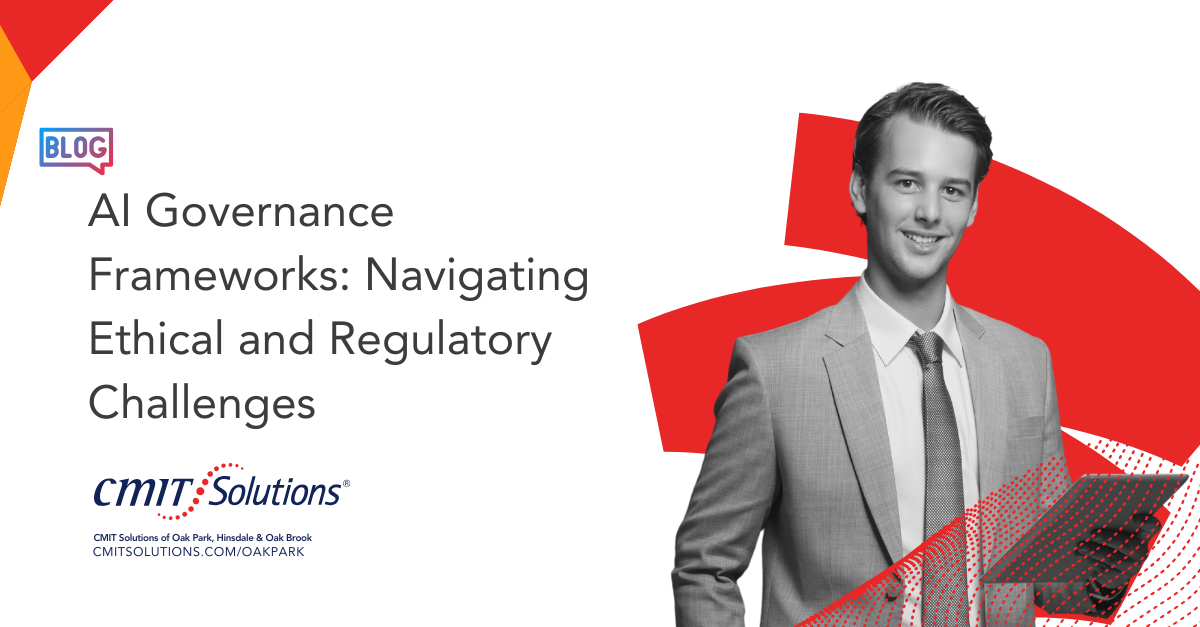The Need for AI Governance
As artificial intelligence evolves rapidly and becomes more embedded in our personal and professional lives, the demand for clear and robust AI governance frameworks has never been greater. AI systems influence healthcare, law enforcement, finance, education, cybersecurity, and business strategy. For forward-thinking organizations like CMIT Solutions of Oak Park, Hinsdale & Oak Brook, embracing AI means also embracing responsibility, transparency, and trust.
AI governance provides the policies, procedures, and accountability mechanisms needed to guide the development, deployment, and monitoring of artificial intelligence technologies. This ensures ethical integrity, legal compliance, and business continuity in a world driven by algorithms.
Understanding AI Governance Frameworks
AI governance frameworks are structured sets of rules and best practices that help companies manage the ethical, legal, and operational aspects of AI technologies. These frameworks typically include:
- Ethical principles (fairness, transparency, accountability, privacy)
- Risk management protocols
- Regulatory compliance guidance
- Auditing and monitoring tools
- Stakeholder involvement practices
Just as businesses rely on compliance strategies, AI governance provides a foundation for accountability and protection in digital transformation.
Benefits and Advantages of AI Governance
AI governance isn’t just about checking off compliance boxes—it’s about fostering sustainable innovation. When organizations prioritize governance, they proactively build systems that are not only secure and ethical but also scalable and trustworthy.
Governance frameworks help mitigate bias in algorithms, protect user data from misuse, and ensure transparency in decision-making. For example, businesses that use AI in customer interactions benefit from higher satisfaction when users understand how and why recommendations are made.
Beyond risk mitigation, governance empowers companies to innovate faster. With structured controls in place, legal bottlenecks are reduced, and new AI deployments face fewer hurdles.
Core benefits of AI governance include:
- Risk Reduction: Helps prevent harmful outcomes like discrimination or privacy violations.
- Improved Accountability: Clear documentation and responsibility mapping reduce legal exposure.
- Public Trust: Transparent and ethical AI fosters user and customer confidence.
- Compliance Readiness: Enables easy adaptation to evolving local and global AI regulations.
- Operational Efficiency: Prevents disruption by aligning AI behavior with company standards.
Additionally, AI governance contributes to long-term brand reputation. When businesses can demonstrate to regulators, customers, and investors that their AI systems are safe, fair, and explainable, they build a competitive advantage rooted in trust and integrity.
Practical Uses of AI Governance in Business
AI governance frameworks are not just theoretical—they drive real change across industries:
In healthcare, governance ensures that diagnostic tools treat patients equitably, avoid reinforcing disparities, and maintain the confidentiality of sensitive health data. With strong policies in place, institutions can leverage AI for faster, more accurate assessments without compromising ethics.
In financial services, AI systems are increasingly used for loan approvals and fraud detection. A robust governance model ensures these tools do not inherit racial, gender, or socioeconomic biases from historical data, creating fairer outcomes for all applicants.
Meanwhile, retailers using AI for product recommendations or customer service must carefully govern how consumer data is collected, stored, and applied. With governance in place, these companies can enhance personalization without invading privacy.
Finally, educational platforms using adaptive learning or monitoring tools must navigate ethical concerns around student data, surveillance, and fairness in performance evaluations. Governance helps maintain transparency and ensures compliance with privacy standards.
Other use cases include:
- Human Resources: AI tools used in hiring decisions can be governed to prevent algorithmic bias and promote equal opportunity.
- Public Sector: Government agencies can deploy AI transparently in areas such as traffic monitoring or social program eligibility.
- Manufacturing: AI in predictive maintenance or automation can be monitored to ensure safety and efficiency standards are met.
Conclusion: Governing AI with Confidence
AI holds immense promise—but only if managed with foresight and discipline. A governance framework that blends ethics, compliance, and innovation is essential to future-proofing your digital investments.
At CMIT Solutions of Oak Park, Hinsdale & Oak Brook, we guide organizations through their AI journey—ensuring responsible use of technology through strong policy, strategic managed services, and long-term digital resilience.






